enroll now ——–>Gastroparesis

Gastroparesis is a condition in which your stomach cannot empty itself of food in a normal fashion. It can be caused by damage to the vagus nerve, which regulates the digestive system. A damaged vagus nerve prevents the muscles in the stomach and intestine from functioning, preventing food from moving through the digestive system properly. Often, the cause of gastroparesis is unknown.
Enroll now——>Ulcerative colitis
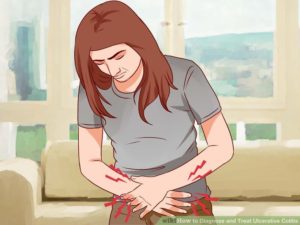
Ulcerative colitis is a chronic inflammation of the large intestine (colon). The colon is the part of the digestive system where water is removed from undigested material, and the remaining waste material is stored. The rectum is the end of the colon adjacent to the anus. In patients with ulcerative colitis, ulcers and inflammation of the inner lining of the colon lead to symptoms of abdominal pain, diarrhea, and rectal bleeding.
Ulcerative colitis is closely related to another condition of inflammation of the intestines called Crohn’s disease. Together, they are frequently referred to as inflammatory bowel disease (IBD). Ulcerative colitis and Crohn’s diseases are chronic conditions. Grohn’s disease can affect any portion of the gastrointestinal tract, including all layers of the bowel wall. It may not be limited to the GI tract (affecting the liver, skin, eyes, and joints). UC only affects the lining of the colon (large bowel). Men and women are affected equally. They most commonly begin during adolescence and early adulthood, but they also can begin during childhood and later in life.
Enroll now——–>Crohn’s

Crohn’s disease (sometimes called Crohn disease) is a chronic inflammatory disease of the intestines. It primarily causes ulcerations (breaks in the lining) of the small and large intestines, but can affect the digestive system anywhere from the mouth to the anus. It is named after the physician who described the disease in 1932. It also is called granulomatous enteritis or colitis, regional enteritis, ileitis, or terminal ileitis.
Crohn’s disease is related closely to another chronic inflammatory condition that involves only the colon called ulcerative colitis. Together, Crohn’s disease and ulcerative colitis are frequently referred to as inflammatory bowel disease (IBD). Ulcerative colitis and Crohn’s disease have no medical cure. Once the diseases begin, they tend to fluctuate between periods of inactivity (remission) and activity (relapse).
Enroll now——>Diabetes
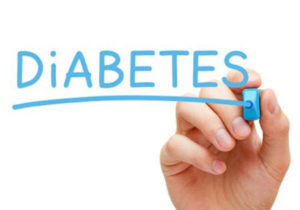
Diabetes is a number of diseases that involve problems with the hormone insulin. Normally, the pancreas (an organ behind the stomach) releases insulin to help your body store and use the sugar and fat from the food you eat. Diabetes when one of the following occurs:
- When the pancreas does not produce any insulin.
- When the pancreas produces very little insulin.
- When the body does not respond appropriately to insulin, a condition called “insulin resistance.”
Diabetes is a lifelong disease. Approximately 18.2 million Americans have the disease and almost one third ( or approximately 5.2 million) are unaware that they have it. An additional 41 million people have pre-diabetes. As yet, there is no cure. People with diabetes need to manage their disease to stay healthy.
Enroll now——>High cholesterol

Too much cholesterol (ko-LES-ter-ol) in the blood, or high blood cholesterol, can be serious. People with high blood cholesterol have a greater chance of getting heart disease. High blood cholesterol itself does not cause symptoms, so many people are unaware that their cholesterol level is too high.
To understand high blood cholesterol, it is important to know more about cholesterol.
- Cholesterol is a waxy, fat-like substance that is found in all cells of the body. Your body needs some cholesterol to work the right way and makes all the cholesterol you need.
- Cholesterol is also found in some of the foods you eat.
- You use cholesterol to make hormones, Vitamin D, and substances that help you digest foods.
Enroll now ——–>Heart Disease

The heart is like any other muscle in body. It needs an adequate blood supply to provide oxygen to allow the muscle to contract and pump. Not only does the heart pump blood to the rest of the body, it also pumps blood to itself via the coronary arteries. These arteries originate from the base of the aorta (the major blood vessel that carries oxygenated blood from the heart) and then branch out along the surface of the heart.
When one or more coronary arteries narrow, it may make it difficult for adequate blood to reach the heart, especially during exercise. This can cause the heart muscle to ache like any other muscle in the body. Should the arteries continue to narrow, it may take less activity to stress the heart and provoke symptoms. The classic symptoms of chest pain or pressure and shortness of breath due to cardiovascular or coronary artery disease are called angina.
Enroll now——>Clostridium Dificile

The average human digestive tract is home to as many as 1,000 species of microorganisms. Most of them are harmless — or even helpful — under normal circumstances. But when something upsets the balance of these organisms in your gut, otherwise harmless bacteria can grow out of control and make you sick. One of the worst offenders is a bacterium called Clostridium difficile(C. difficile, or C. diff). As the bacteria overgrow they release toxins that attack the lining of the intestines, causing a condition called Clostridium difficilecolitis.
Though relatively rare compared to other intestinal bacteria, C. diff is one of the most important causes of infectious diarrhea in the U.S.
Enroll now ——–>Vaccine studies

Enroll now——>Fatty Liver

Some fat in your liver is normal. But if it makes up more than 5%-10% of the organ’s weight, you may have fatty liver disease. If you’re a drinker, stop. That’s one of the key causes of the condition.
There are two main types of fatty liver disease:
- Alcoholic liver disease (ALD)
- Nonalcoholic fatty liver disease (NAFLD)
Enroll now—->Psoriasis
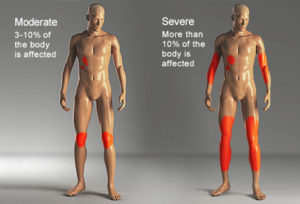
Psoriasis is a chronic (long-lasting) skin disease of scaling and inflammation that affects greater than 3 percent of the U.S. population, or more than 5 million adults. Although the disease occurs in all age groups, it primarily affects adults. It appears about equally in males and females.
Psoriasis occurs when skin cells quickly rise from their origin below the surface of the skin and pile up on the surface before they have a chance to mature. Usually this movement (also called turnover) takes about a month, but in psoriasis it may occur in only a few days.
In its typical form, psoriasis results in patches of thick, red (inflamed) skin covered with silvery scales. These patches, which are sometimes referred to as plaques, usually itch or feel sore. They most often occur on the elbows, knees, other parts of the legs, scalp, lower back, face, palms, and soles of the feet, but they can occur on skin anywhere on the body. The disease may also affect the fingernails, the toenails, and the soft tissues of the genitals, and inside the mouth. Although it is not unusual for the skin around affected joints to crack, some people with psoriasis experience joint inflammation that produces symptoms of arthritis. This condition is called psoriatic arthritis.
Enroll now—–>Rheumatoid Arthritis
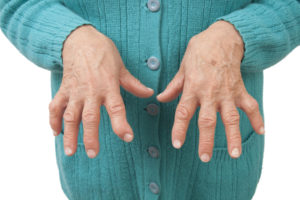
Rheumatoid arthritis (RA) is an inflammatory disease that causes pain, swelling, stiffness, and loss of function in the joints. It occurs when the immune system, which normally defends the body from invading organisms, turns its attack against the membrane lining the joints.
Rheumatoid arthritis has several features that make it different from other kinds of arthritis. (See box “Features of Rheumatoid Arthritis.”) For example, rheumatoid arthritis generally occurs in a symmetrical pattern, meaning that if one knee or hand is involved, the other one also is. The disease often affects the wrist joints and the finger joints closest to the hand. It can also affect other parts of the body besides the joints. (See “What Happens in Rheumatoid Arthritis?”) In addition, people with rheumatoid arthritis may have fatigue, occasional fevers, and a loss of energy.
The course of rheumatoid arthritis can range from mild to severe. In most cases it is chronic, meaning it lasts a long time—often a lifetime. For many people, periods of relatively mild disease activity are punctuated by flares, or times of heightened disease activity. In others, symptoms are constant.
Enroll now—–>Renal Failure
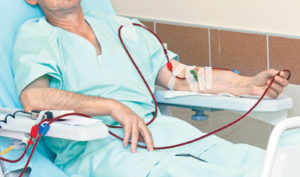
- Kidneys are the organs that help filter waste products from the blood. They are also involved in regulating blood pressure, electrolyte balance, and red blood cell production in the body.
- Symptoms of kidney failure are due to the build-up of waste products in the body that may cause weakness, shortness of breath, lethargy, and confusion. Inability to remove potassium from the bloodstream may lead to abnormal heart rhythms and sudden death. Initially kidney failure may cause no symptoms.
- There are numerous causes of kidney failure, and treatment of the underlying disease may be the first step in correcting the kidney abnormality.
- Some causes of kidney failure are treatable and the kidney function may return to normal. Unfortunately, kidney failure may be progressive in other situations and may be irreversible.
To join our DATABASE please fill out your name and email. Also please add in message box the clinical trial you are interested in, and your phone number for us to contact you.
To find out if you qualify for any of our studies and compensation please call 1 866 947 6815